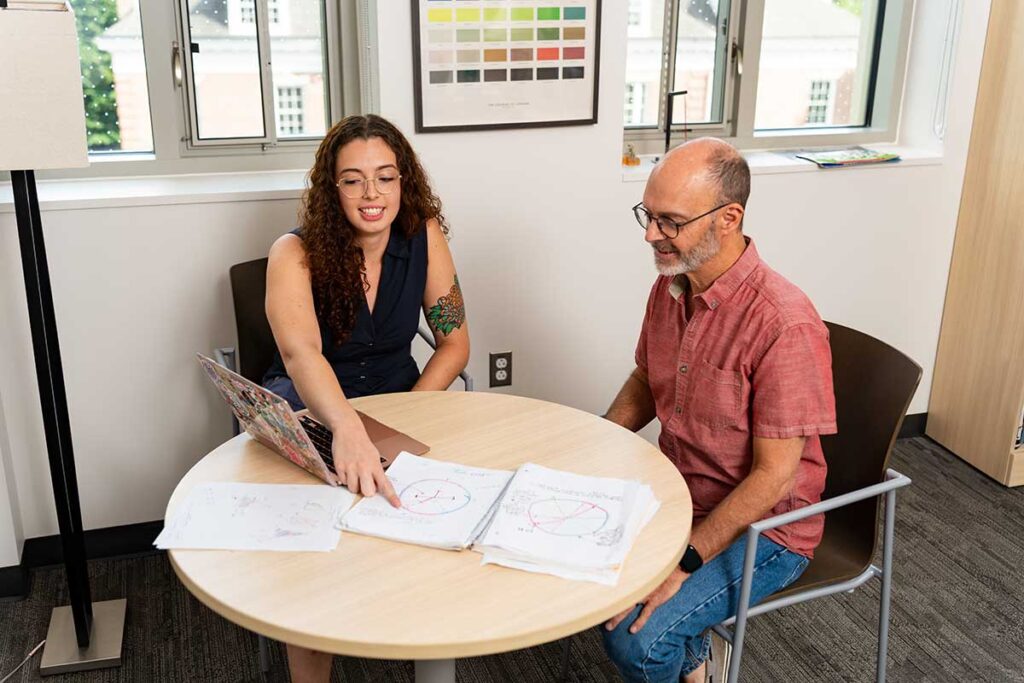Building an enhanced student experience
By Stella Katsipoutis-Varkanis

This summer, EXCEL Scholar Mita Crane ’26 used her coding skills to create a new feature for software used by Prof. Chris Ruebeck to teach economic concepts in his Industrial Organization course. | Photos by JaQuan Alston
Taking her coding skills to the next level, EXCEL Scholar Mita Crane ’26 spent this summer creating a new way for students to visualize the economic concepts they’re learning in Prof. Chris Ruebeck’s Industrial Organization: Market Structure and Strategy course.
In the course, Ruebeck, associate professor of economics, utilizes a market-simulating game to give students a realistic look at how factors like competition, product pricing, production costs, and others come into play in various market structures. The simulation software—which Ruebeck originally began coding when he was in graduate school and has continued to develop in recent years with his research collaborator Joe Harrington, Patrick T. Harker Professor of Business Economics and Public Policy at Wharton—gives students the opportunity to act as market firms pricing and selling products, and manipulate decision variables with the objective of maximizing profits for their firm.
“Students work in teams to make decisions like whether to introduce a product very similar to an existing product to be in direct competition, or unlike existing products to be less competitively engaged. They determine prices, spend money on cost-reducing investment, and more,” Ruebeck says. “They also have to anticipate and consider what decisions the other teams are making. This helps students think about how they can use economic theory to understand firms’ behavior, and perhaps make their own decisions in the future about product introduction and innovation.”
One feature Ruebeck and Harrington have long hoped to bring to the simulator is a visual interface that shows game participants the results of their decisions. That’s where Crane and her coding savvy came in. Beginning in May, Crane closely worked with Ruebeck throughout the summer to conceptualize the final visual representation—and then coded their ideas to life.

Ruebeck and Crane worked together throughout the summer to map out the software’s visual features that were eventually to be coded by Crane—and which will be implemented by Ruebeck in the spring semester.
“We spent weeks discussing what we wanted the format to be and drew sketches of what we thought it should look like, and from there I created the code that would allow the game to create a visual chart that brings all the data about each product into one visual display,” Crane says. The aim of the imagery she adds, is to help students understand and compare data more easily.
Ruebeck, who plans to use the new feature in the course this coming spring semester, says, “Students will get a better picture of the situation, which will lead to more insights—even as they don’t have to work quite so hard to understand the abstraction.”
This project was not the first Crane collaborated on with Ruebeck: After initially connecting with Ruebeck when she took his Principles of Economics and Game Theory courses as a first-year student, Crane has worked with Ruebeck on several EXCEL research projects, including one last summer, in which she helped him identify and fix a bug in the same market simulator software she helped augment this year.
“The EXCEL Scholar Program and other similar research programs illustrate the emphasis Lafayette places on collaboration between professors and students,” Ruebeck says. “While helping to further faculty research goals, they also allow students to gain a great deal from interacting with faculty in support of those goals—and that can generate student interests that branch off from them.”

Working on multiple EXCEL Research projects with Ruebeck, Crane says, and getting to study a specific topic in depth are unique opportunities that have taught her she can “learn and do anything.”
Exploring her interest in coding with Ruebeck, Crane explains, has inspired her to consider how she can continue to develop and apply that skill in other areas of her academic and professional career.
“The opportunity to study this topic in so many different ways over the years and to get to know a professor so well is unique to Lafayette,” she says. “Prof. Ruebeck is incredibly smart and supportive, and he’s always encouraging me to pursue my own ideas. It makes me feel like I’m contributing to something bigger.” These experiences, she adds, are valuable because they gave her a feel for what it might be like to work on such projects for a company in the future. “They taught me that I can learn and do anything—and gave me the confidence to pursue the unfamiliar.”

